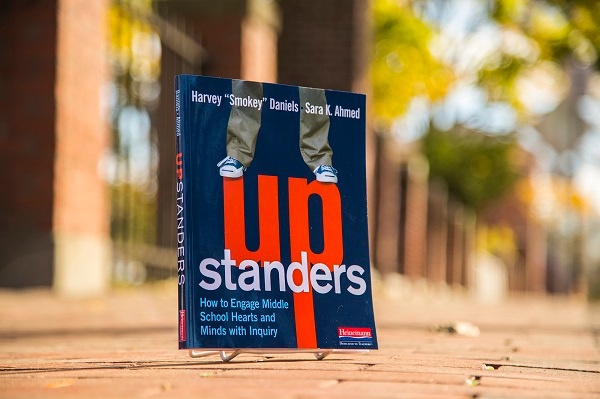
Upstanders: How to Engage Middle School Hearts and Minds with Inquiry is a new book from Harvey “Smokey” Daniels (@smokeylit) and Sara Ahmed (@SaraKAhmed). Upstanders invites you into the classroom of Sara Ahmed to see her teaching in action. With Smokey Daniels as your guide you'll see exactly how Sara uses inquiry to turn required middle school curricular topics into questions so fascinating that young adolescents can't resist investigating them. In our Upstanders blog series, Sara and Smokey will highlight topics in the book related to middle school and helping kids go from bystanders to upstanders. In this blog, Sara looks at what to share and what not to share with students.
Identity Webs
by Harvey “Smokey” Daniels and Sara K. Ahmed
While there is merit to establishing a positive and respectful rapport with your students from the get-go, I always lean toward mutual respect and letting them know you are also a human being who doesn’t sleep under her desk at night. In his infinite wisdom, Donald Graves reminds us to always know our students in facts and actions; to really know who they are before we can teach them (1983). There should be an expectation that we are sharing our lives with the students the same way we are asking them to share their lives with us. We do this by sharing our reading lives and our writing lives in workshop lessons and book talks, and in those first weeks when we ask them to create “Me” projects that share pieces of their identity.
I introduce identity webs and create my own in front of the kids the first day or two of school. I talk about why I have National Geographic, Time for Kids, and Sports Illustrated for Kids bursting out of the baskets in the classroom. I am a reader, I love to travel, and I love sports. I notice what the kids are wearing and find ways to connect with them via jerseys or shoes, or by offering validation for a fashion risk they decided to take. There are some personality and style liberties that I take as well. I am a sports fanatic, I love fashion, and I would rather read YA and watch YA television and movies than anything else. My family and friends will tell you that I also have YA eating habits. I share these things in snippets and I ask questions to empower kids to reciprocate. I share how important my relationships with my family and friends in Chicago are to me. I have already lived middle school and I don’t plan on living vicariously through them, but I often talk about my middle school experience when it is appropriate. My favorite thing to tell is that my best girlfriends today became my best girlfriends when I was eleven, in middle school.
There is a balance between overexposure and opening a window into who you are.
I reveal personal information when it makes sense to strengthen a rapport or extend an olive branch, or if the kids simply ask. There is a balance between overexposure and opening a window into who you are. I work to find that place each day, a place where I gain a piece of them, and they have a takeaway of me. I am approachable, open, and friendly, but not their friend. Walking this fine line appropriately makes me available to them as a teacher, but also as an adult they can connect with on any given day. Being able to recommend great books or magazine and newspaper articles on the things we love in common is a plus.
Things I don’t share include any love stories, from middle school to present day, and in turn, I don’t ask about their budding romances either. And if they ask me for love advice, I let them know I have a little schema about this, but I don’t go any further than asking, “Well, would you rather continue talking to them and be friends, or say you are ‘going out’ and then pretend to ignore each other and act super weird when you are in the same room?” The kids laugh, but I have seen more teddy bears thrown in the garbage on Valentine’s Day than Gund would care to know about.
♦ ♦ ♦ ♦
 Sara K. Ahmed has taught in urban, suburban, public, independent, and international schools. Harvey "Smokey" Daniels has been a city and suburban classroom teacher and college professor, and now works as a national consultant and author on literacy education.
Sara K. Ahmed has taught in urban, suburban, public, independent, and international schools. Harvey "Smokey" Daniels has been a city and suburban classroom teacher and college professor, and now works as a national consultant and author on literacy education.


